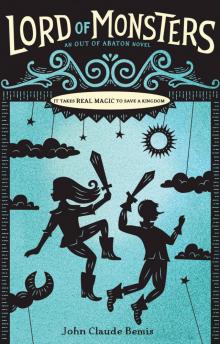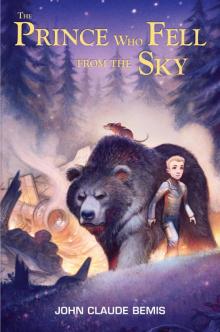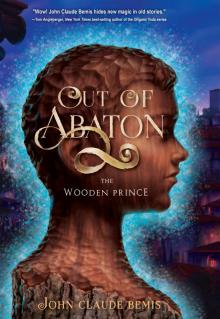- Home
- John Claude Bemis
The Nine Pound Hammer
The Nine Pound Hammer Read online
For Amy—my love, my lodestone
1. The Orphan Train
2. The Dandelion Hat
3. The Giant and His Guide
4. The Medicine Show’s Train
5. A New Arrival
6. Tonics
7. Roots and Herbs
8. The Swamp Siren
9. Steam, Oil, and Flame
10. The Rabbit’s Foot
11. The Pirate Queen
12. Ironclad Hunter
13. The Nine Pound Hammer
14. To the Hill Country
15. Children of the Ramblers
16. Hoarfrost
17. Bottletrees
18. Broken Track
19. The Copper
20. Releasing the Caboose
21. The Pitch Dark Train
22. The River
HE WAS BEING HUNTED.
The man sank to his knees in black water. The night air pulsed with the reverberations of a multitude of insects, punctuated by bullfrog croaks and the occasional splash of something leaving the muddy banks for the safety of the swamp water.
Before him, two others struggled through the marsh.
“Go!” he cried. Dragging his legs through the muck, he pulled himself up on cypress knees to the slippery embankment. Free of the mire, he ran. The palmettos and spiny bracken tore his trousers as he ripped away low-hanging limbs and spirals of Spanish moss.
Some distance behind, a hound bayed.
The other two stopped before a large pond. One was a girl with wide eyes as fierce as lightning flashes. Scratches crisscrossed her pale arms, and a gash on her cheek bled freely. Her lips trembled. By her side stood a man with long dark hair streaked with silver; it fell about his face and covered his eyes. He held the girl’s arm with one hand.
In the other he held a sparkling silver pistol.
The girl pulled toward the pond.
“No,” the gunman said. “We need another way.”
“But … the hound!” she cried.
As if in answer, a roar erupted from the dark, shaking the trees around them and silencing the buzzing chorus of insects and frogs. An icy breeze pushed back their hair as their damp clothes grew crisp.
“Go around,” the first man said. “Follow the pond’s edge to the north and there’s a crossing.”
The gunman nodded and urged the girl forward. As the two disappeared into the brush, another roar tore through the trees, felling limbs and flattening shrubs. The moisture in the marshy earth froze, pushing to the surface in splinters of ice. At his back, the man heard the cracking of ice forming at the edge of the pond. He removed his straw hat and dropped it to the ground.
With a snort of cold air, an enormous muzzle broke through the trees. Slowly the hound stepped out. More massive than a bull, it was seven feet at the shoulder. Its jaws were huge. Each tooth was as long as a hunting knife. Its dark metallic eyes were set deep into bone-white fur, tufted and spiked with frost. The groaning and whining of gears churned from beneath its flesh.
The man faced the monstrous hound as it snarled and leaped forward.
Ray jerked awake. The voices of the other orphans chirped over the rattle of the train. He was in the passenger car, Mister Grevol’s exquisite passenger car, with his sister, Sally, napping at his side.
Ray settled back onto the soft velvet bench and opened his hand. On his sweaty palm lay the lodestone. He hadn’t meant to nod off with it in his hand. He knew better.
Pushing the lodestone into his pocket, Ray craned his neck to scan the passenger car for Miss Corey. She was still not back.
Miss Corey had given the orphans an extensive list of rules, instructions, and threats the morning before Ray and Sally and the other seventeen children boarded the beautiful, dark train with its powerful ten-wheeler locomotive:
“Mister G. Octavius Grevol is a highly respected industrialist,” Miss Corey had warbled. “He has generously allowed us passage on his personal train. I expect you”—she had looked directly at Ray, who at twelve was the oldest of the orphans—“to be well-behaved, well-mannered, and to remain at all times in the passenger car designated for our use.”
But Ray had never been very good at listening to rules, instructions, or threats. He had decisions to make and needed someplace quiet to think. As he stood, he glanced down at Sally. With her hands pillowing her dirty cheek on the upholstered bench and her tattered boots kicked up against the lacquered black paneling, Sally—all the orphans, really—looked out of place in Mister Grevol’s princely train.
Ray started down the aisle toward the back of the passenger car. He stumbled a moment with the sway of the train but steadied himself against the back of the next bench before continuing. Some of the orphans were taking naps, but most were talking boisterously or playing with jackstraws or corn-husk dolls on the ornately quilted seats. They were excited, and they had good reason. They were traveling on a marvelous train away from the horrible city. Soon they would reach the South, where Miss Corey had arranged for them to be adopted. Wishing he could share their enthusiasm, Ray reached for the vestibule door’s polished brass handle.
As he stepped out onto the vestibule, a coal-smoke wind met him, accompanied by the noisy clatter of the train’s wheels. He quickly shut the door. Finally, he was alone.
The vestibule was a short open-air passage between the train cars. Ray settled his elbows on the railing and looked out at the green and gold fields speckled with clusters of trees and white clapboard farmhouses. The wind batted his brown curls across his brow. Ray pushed them back as he took the lodestone from his pocket.
The lodestone began moving at once, tugging against his grip. Ray clutched it tighter and wondered, as he had again and again over the last month: What was it pulling toward and why did it keep showing him the monstrous hound?
His father had given him the dark stone eight years ago—before Sally was born, before his father had left. Ray had only been four at the time, but he still remembered it vividly.
“I’m heading down south for a job of work, Ray,” his father had said that morning on the banks of Lake Wesserunsett in rural Maine. His father had grown up in the Blue Ridge Mountains of eastern Tennessee, and his words sometimes sounded funny compared to the way New Englanders spoke. “Might be a spell before I’m back.”
Then his father had taken out the flannel pouch he always carried in his pocket. He opened the drawstring and slowly removed a rock.
“What is it?” Ray asked.
“That’s a lodestone,” his father said, placing the stone in Ray’s hand. “They’re magnetic. Folks use them to make compasses. But this ain’t no ordinary lodestone. I want you to keep it safe while I’m gone. It’ll guide you when you have a need.” Then he added with his lopsided smile, “It’ll help me get back home, too.”
But it hadn’t. Ray’s father had never returned. Eight years had passed. Eight terrible years.
Ray looked down at his hand, feeling the lodestone pressing against his fingers as if the little stone was struggling to escape.
The door to the next car opened. Ray jumped and backed against the far side of the vestibule. Miss Corey would be furious!
Out stepped a tall, elegantly dressed gentleman. He held a gloved hand to support his silk stovepipe hat against the wind. With his fine striped suit of black and reptilian green and a curling silver mustache sprouting from his angular face, Ray had no doubt who this gentleman was: Mister G. Octavius Grevol.
This was worse than Miss Corey! Miss Corey might take a belt to Ray’s leg, but this man could have him thrown off the train.
Mister Grevol gave a slight “a-hum.” Ray took his woolen apple cap from his pocket and adjusted it tightly over his brow as he headed t
oward the door.
Mister Grevol clanked his ebony walking stick against the metal floor. “What do you think of my train?” he asked. His voice was smooth and refined like the purring of a cat, or possibly more like a lion, as there was an under tone of strength in that soft growl.
“It’s okay. I never cared much for trains,” Ray lied, hoping to put off the gentleman without causing offense.
Mister Grevol smirked and removed his stovepipe hat. He propped his gloved hands together on the silver cap of his walking stick, letting his gaze settle on the ribbon of black smoke that was drifting off from the locomotive into the clear summer sky.
Ray eyed the gold chain dangling between Mister Grevol’s vest pockets. If Ray had encountered this gentleman a few months earlier on the streets of Manhattan, he might have excused himself, squeezed past the gentleman with a polite apology, and walked away with the gentleman’s gold watch. But this was not Manhattan. And he no longer needed to steal in order to keep Sally warm and fed.
“See, my parents were killed by a train,” Ray told Mister Grevol. He flicked his eyes toward the towering gentleman. A curious expression showed in Mister Grevol’s crooked black eyebrows.
“How terrible,” Mister Grevol replied, his eyes wandering to the lodestone in Ray’s hand, then following the several feet of twine attaching it to Ray’s belt. “Growing up alone can be a challenging prospect. Dangerous, I’m certain. But a boy like you is full of resources. I deduced right away that you are clever and, might I add, daring. I bet you’ve done all manner of doughty deeds. For example, may I ask, have you ever jumped from a moving train?”
Ray frowned. He had tried to rattle the old gentleman with his lie about how he had become an orphan, and now Mister Grevol was turning the trick on him.
“Lots of times, dozens of times,” Ray answered, which was in fact true. “Back in the city, I could get on a moving train and off again better than any of the other kids. They called me Spark ’cause I could jump on and off trains and streetcars like a spark jumps from flint.”
Mister Grevol chuckled. “Isn’t that impressive!” He brushed at his sleeves with his black leather gloves. “And refreshing.”
“Refreshing?” Puzzlement flickered on Ray’s brow.
“Your honesty,” Mister Grevol said. “At last.”
Ray felt like a deflated balloon. Somehow Mister Grevol had seen through his lies. “I’m sorry. I didn’t mean to … I know I shouldn’t have left the passenger car. … ”
Mister Grevol cocked his head, narrowing his black eyes.
Ray looked down, running his thumb across the knot in the twine that was wrapped over and over the lodestone’s surface. “I just needed a place to think, and I thought I could come out here and—”
“And then I so rudely interrupted you.” Before Ray could argue, Mister Grevol shook his head in polite disagreement. “No, I did. What’s worrying you, if I may ask?”
“It’s my sister,” Ray said. “We’ve had such a hard life, you see? And now we’re supposed to get adopted … by someone. A nice farm family, I’m sure. But families almost adopted us lots of times in the city, and they always changed their minds. Because of me … I’m just too old, I guess. I’m not so sure if she’s to get a good family that I should stay with her.” Ray gave a deep sigh, feeling the tightness in his throat.
Mister Grevol nodded sympathetically. “You’re a considerate and wise young man. And you’re right to be concerned for your sister. But I’m wondering about you. I’m wondering what you will do.”
“What do you mean?” Ray asked.
Mister Grevol brought his hand to his cravat. “Look at me. I’ve built a career in locomotives and engineering. And how? By disdaining the easy, comfortable life. I’ve avoided attachments, do you see?”
Ray began to mumble, but Mister Grevol pointed a finger at him and continued. “Attachments are vicious betrayers. They lead to all sorts of unsettling feelings: jealousy, loneliness, dependence, the need for acceptance. The sooner you unchain yourself from others, the sooner you’ll find your true strength. And the sooner you do that, the sooner you’ll find your true destiny.”
He looked down at Ray, drawing his eyes across him and then the lodestone, before a smile returned to his wide mouth. “You most clearly have street smarts, as they like to say. You have gumption. Let me ask you: Is this train really going to bring you to your destiny? Are you going to leave your fate to”—Mister Grevol waved his hand toward the car with the orphans—“that Corey woman?” He shook his head and lowered his voice. “No. Find your own way in this world.”
The door from the next car opened, and a man wearing a dark, plain-cut suit and a round bowler hat leaned out. He grinned sourly at Ray, flashing a gold tooth, before turning to Mister Grevol. “Excuse me, sir. Mister Horne wanted to see you.”
“Thank you, Mister McDevitt.” Grevol looked back at Ray. “I’ve enjoyed meeting you …” He paused, gesturing with his walking stick.
“Oh! Uh, Ray. Ray Fleming,” he said.
“Yes, Ray Fleming.” Mister Grevol tipped his head at Ray before following the man with the gold tooth.
Ray watched them depart through the coupe door, wondered if the gentleman had realized that Ray had once again lied when he gave his last name.
The lie about his last name had come too quickly for Ray to stop. He had been Ray Fleming for so long now, it had become habit.
After his father left—the same year Sally was born—his mother had insisted they no longer use their last name, Cobb, and began moving them from city to city. She would never explain why. Ray kept expecting his father to return, but the years passed and he never did.
While the lodestone hadn’t helped his father return, it had helped Ray and Sally. Even before their mother had died of scarlet fever, the lodestone had begun giving Ray dreams—sometimes of a cascading waterfall or a campfire crackling—but the dreams were more vivid than ordinary dreams. Others were fantastical. A man leaping from a high bluff, only to become a great hawk, then flash and disappear. A moonlit beach where silver-skinned women rose from the surf.
The dreams were interesting, but they weren’t what helped Ray and Sally. After their mother died and the two were forced to live in the squalor of lower Manhattan, Ray did what he had to to take care of Sally. Sometimes he stole food or people’s purses, whichever was easier.
But more often the lodestone would help. Ray would feel a sudden shudder from his pocket. He would take out the lodestone and follow the jerking movements until it led him to a dropped coin or a forgotten bag of apples in the back of a livery or a bunch of old boxes in an alley they could use for shelter.
Then a month ago, just after Sally had met Miss Corey and convinced Ray to move into the orphanage, the lodestone began pulling urgently to the south. Ray had snuck out from St. Anthony’s Home to see what it was pulling toward. It always led him to the southern end of Manhattan Island. Wherever it was leading Ray was much farther south.
The nightmare had begun at the same time. The terrible vision of the hound pursuing him—although Ray somehow knew it wasn’t him—through the swamp.
Ray had always wondered if his father had known what the lodestone could do. Had he meant it to help Ray? Were the dreams showing him something his father had wanted Ray to know?
Ray looked back through the window into the passenger car. Sally was peering up and down the aisle, looking for him. He put the lodestone back in his pocket and reached for the door.
Sally was stringing a cat’s cradle when Ray returned to the seat beside her.
“Miss Corey said we’re not supposed to leave the car,” she said, spreading her small fingers wide as Ray moved the string through the tangled design.
“Just stepped out for some air.”
She frowned at him. “Something’s bothering you.”
Ray continued threading the cat’s cradle with her. “No, there’s not.”
She slipped her hands from the web of string and
pressed her finger against his furrowed brow.
Ray laughed. “What would I be fretting about?” He pushed her finger away. “You’re going to get a wonderful family, just like you’ve always wanted.”
“We’re going to get a wonderful family,” Sally corrected. She untangled the grimy muslin dress from her knees before nestling herself into Ray’s arms. “Our family will take care of us and we’ll be together, just like you promised. So stop fretting and read me some of my book.”
Ray picked up the small, blue-linen-bound book from the seat and opened it.
“Ray,” Sally asked, her head leaning against his shoulder, “do you think our new family will mind if we read Papa’s book?”
“No,” Ray said, opening The Incunabula of Wandering to a chapter on rabbit warrens. “I’m sure they won’t.”
Their mother had never liked them reading the Incunabula, though Ray had not known why. His father had scribbled notes in the margins, covering any blank space. Ray had tried over the years to understand the book, to learn something more about his father from the notes. But he could barely decipher his father’s cursive script, and the bits he could read were too bizarre to gather their meaning. He wasn’t even sure what the book was about; it seemed to be composed of random and unrelated chapters. It was full of poems and articles on animals, wild herbs, topography, and more complicated subjects.
It wasn’t just the book that had caused their mother to act secretive. She had never wanted to discuss anything to do with their father. After eight years, after all they had gone through, Ray had to assume that his father was dead. Why else wouldn’t he have come back?
But what had happened to him?
In the night, the only sounds on the train were the rumbling of the metal wheels on the track and the soft breathing of the children. The lights had been dimmed, but Ray couldn’t sleep. He watched the moon race behind the trees as he tried to quiet his thoughts.
He squeezed the lodestone, feeling its heavy pull. Would Sally be better off without him?
Ray’s thoughts were interrupted by the sound of the door opening behind him. Footsteps thumped down the aisle, and Ray quickly feigned sleep. A figure passed him, the crisp knocks of leather boots alternating with the clunk of a walking stick on the wooden floor. Ray peered up in time to see the black and reptilian-green suit disappear out the door. Through the window, the vestibule was dark but for an orange glow that illuminated Mister Grevol’s face as he lit a cigarillo.

 The White City
The White City Lord of Monsters
Lord of Monsters The Prince Who Fell from the Sky
The Prince Who Fell from the Sky The Nine Pound Hammer
The Nine Pound Hammer The Wooden Prince
The Wooden Prince The Wolf Tree
The Wolf Tree